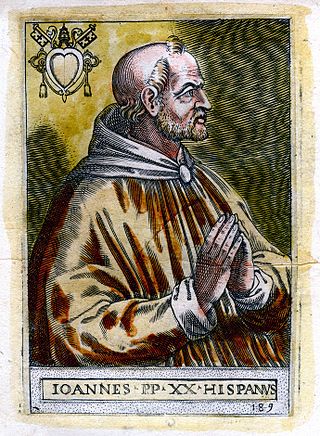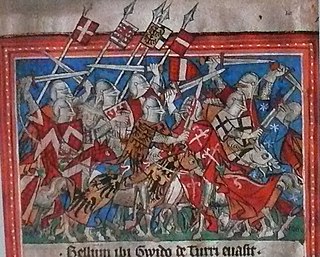
Pope Gregory X, born Teobaldo Visconti, was head of the Catholic Church and ruler of the Papal States from 1 September 1271 to his death and was a member of the Secular Franciscan Order. He was elected at the conclusion of a papal election that ran from 1268 to 1271, the longest papal election in the history of the Catholic Church.

Luchino Visconti di Modrone, Count of Lonate Pozzolo was an Italian filmmaker, theatre and opera director, and screenwriter. He was one of the fathers of cinematic neorealism, but later moved towards luxurious, sweeping epics dealing with themes of beauty, decadence, death, and European history, especially the decay of the nobility and the bourgeoisie. Critic Jonathan Jones wrote that “no one did as much to shape Italian cinema as Luchino Visconti.”

Pope Nicholas III, born Giovanni Gaetano Orsini, was head of the Catholic Church and ruler of the Papal States from 25 November 1277 to his death on 22 August 1280.

Galeazzo II Visconti was a member of the Visconti dynasty and a ruler of Milan, Italy. His most notable military campaigns were against Pope Gregory XI, around 1367. These battles fought between the papacy and the Visconti family ultimately ended in a peace treaty. Politically active, he expanded the power of his family, where the Visconti first became hereditary rulers of Milan starting in 1349. He is remembered in conjunction with his patronage of intellectuals and writers, from his sponsorship of Petrarch to the founding of the University of Pavia in 1361. Galeazzo II Visconti, and his brother Bernabò, are credited with the institution of the Quaresima Torture Protocol, a vicious means of torture.

The Visconti of Milan are a noble Italian family. They rose to power in Milan during the Middle Ages where they ruled from 1277 to 1447, initially as Lords then as Dukes, and several collateral branches still exist. The effective founder of the Visconti Lordship of Milan was the Archbishop Ottone, who wrested control of the city from the rival Della Torre family in 1277.

The Duchy of Milan was a state in Northern Italy, created in 1395 by Gian Galeazzo Visconti, then the lord of Milan, and a member of the important Visconti family, which had been ruling the city since 1277.

Anthony Edward Visconti is an American record producer, musician and singer. Since the late 1960s, he has worked with an array of performers. His first hit single was T. Rex's "Ride a White Swan" in 1970, the first of many hits in collaboration with Marc Bolan. Visconti's lengthiest involvement was with David Bowie: intermittently from the production and arrangement of Bowie's 1968 single "In the Heat of the Morning" / "London Bye Ta-Ta" to his final album Blackstar in 2016, Visconti produced and occasionally performed on many of Bowie's albums. Visconti's work on Blackstar was awarded the Grammy Award for Best Engineered Album, Non-Classical and his production of Angelique Kidjo's Djin Djin received the Grammy Award for Best Contemporary World Music Album.

Filippo Maria Visconti was the duke of Milan from 1412 to 1447. Reports stated that he was "paranoid", but "shrewd as a ruler." He went to war in the 1420s with Romagna, Florence, and Venice in the Wars in Lombardy but was eventually forced to surrender under Pope Martin V. He would return to war again, where another peace agreement was required to stop the war. He married twice. Her second wife was Marie, from which he married in 1448. She was the daughter of his ally Amadeus VIII. When he died, Fillippo was the last of the Visconti male line and was succeeded by Francesco Sforza, husband to his daughter.

Bernabò or Barnabò Visconti was an Italian soldier and statesman who was Lord of Milan. Along with his brothers Matteo and Galeazzo II, he inherited the lordship of Milan from his uncle Giovanni. Later in 1355, he and Galeazzo II were rumoured to have murdered their brother Matteo since he endangered the regime. When Galeazzo II died, he shared Milan's lordship with his nephew Gian Galeazzo. Bernabò was a ruthless despot toward his subjects and did not hesitate to face emperors and popes, including Pope Urban V. The conflict with the Church caused him several excommunications. On 6 May 1385, his nephew Gian Galeazzo deposed him. Imprisoned in his castle, Trezzo sull'Adda, he died a few months later, presumably from poisoning.

Giovanni Visconti (1290–1354) was an Italian Roman Catholic cardinal, who was co-ruler in Milan and lord of other Italian cities. He also was a military leader who fought against Florence, and used force to capture and hold other cities.

Ottone Visconti was Archbishop of Milan and Lord of Milan, the first of the Visconti line. Under his rule, the commune of Milan became a strong Ghibelline city and one of the Holy Roman Empire's seats in Italy.

Ugolino Visconti, better known as Nino, was the Giudice of Gallura from 1275 or 1276 to his death. He was a son of Giovanni Visconti and grandson of Ugolino della Gherardesca. He was the first husband of Beatrice d'Este, daughter of Obizzo II d'Este. His symbol was a cock.

The 1268–71 papal election, following the death of Pope Clement IV, was the longest papal election in the history of the Catholic Church. This was due primarily to political infighting between the cardinals. The election of Teobaldo Visconti as Pope Gregory X was the first example of a papal election by "compromise", that is, by the appointment of a committee of six cardinals agreed to by the other remaining ten. The election occurred more than a year after the magistrates of Viterbo locked the cardinals in, reduced their rations to bread and water, and removed the roof of the Palazzo dei Papi di Viterbo where the election took place.
Giovanni Visconti was, according to Lorenzo Cardella, nephew of Pope Gregory X. He was ostensibly created cardinal-bishop of Sabina by his uncle in 1275 and in 1276 was named judge in the case concerning the translation of bishop Giovanni of Potenza to the archbishopric of Monreale, postulated by the cathedral chapter of Monreale. He died in 1277 or 1278.
Bertrand de Saint-Martin was a French cardinal.

The September 1276 papal election is the only papal election to be the third election held in the same year; after Pope Gregory X died, two successors died that year, requiring yet another election. The election was also the first non-conclave, since the establishment of the papal conclave after the papal election, 1268–1271.
Visconti is a surname which may refer to:
Pope Gregory X (1271–1276) create five cardinals in one consistory.

Guido della Torre was a Lord of Milan between 1302 and 1312.

The Visconti Castle of Crenna is a castle of medieval origin located in Crenna, district of Gallarate, Lombardy, Northern Italy. It is linked to the fame of Lodrisio Visconti, who raised against and then reconciled with the family members of his cousin Matteo Visconti, Lord of Milan. In the 14th century, the castle underwent expansion and destruction according to the alternative fortunes of Lodrisio.















